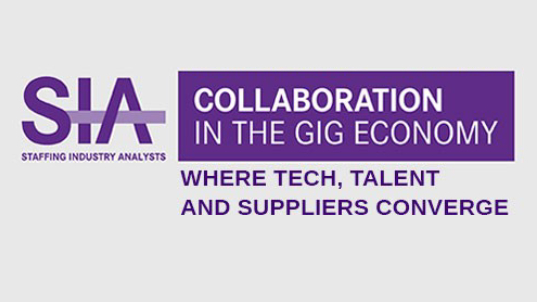GigE Day 2: Technology Platforms - Three Takeaways
3 min | Robert Moffat | Article | Industry news | Workforce management

The annual Collaboration in the Gig Economy conference, or GigE for short, brought together over 500 workforce, staffing, and technology professionals over two days in Dallas, TX.
As with the earlier Contingent Workforce Summit, one of the main themes was Artificial Intelligence but there were a number of other topics covered that are impacting the workforce and those who support it.
A look back, today and forward
The keynote name-checked the major economic events of the past year including inflation, the stalemate in war in Ukraine, and Taylor Swift. Yes, Taylor, and the Swifties attending her tour generated more income than the economies of some countries.
Overall, inflation (82%) and geopolitical instability (69%) have overtaken labor shortages (59%) as the main concern of executives. Despite, or perhaps because of this, the contingent workforce is expected to expand from 22% of the workforce population to 30% in the next 5 years.
In the later session on “The State of Convergence for Tech, Talent and Suppliers” the panel was asked their views on, or definition of, convergence. While some focused on the human aspect “Converging towards to talent and the hiring manager“ and “(its) about the demands of our stakeholders” other focused on the user experience with technology “(stakeholders want it) instantaneous, without friction” and it's up to the industry to “figure out this new technology and how do we Incorporate this technology to create value”.
All agreed we need to use technology to “meet the people where they are”. We also need to "show transparency", following the lead of the likes of Uber or Dominos where you can track your car/pizza whereas your job application appears to disappear into a black hole.
Looking at the future one panelist was “Excited about the trend to self-serve – particularly about engaging talent” with another agreeing “we can call them three times and they still won’t turn up. but when they choose it (themselves via self-serve tech) they turn up” An introduction of the concept of “reverse recruiting” where the talent “recruits” the employer created some noise and would have bene interesting to discuss further.
Platforms
GigE was originally launched to cater for the expansion of talent platforms and big things were expected. While there has been some growth this has been in a select number of functions and roles. One speaker shared “We (platforms) are the small slice of the spend pie”.
Platform have proved highly effective in the industrial sectors where speed is key and perhaps more surprisingly, at least initially to be, in health in education. However, on further review this is because in these sectors the qualification is binary - anyone can claim to be a developer but you either are, or are not, a registered nurse.
There has also been some use for professional skills by small less regulated companies like starts ups or the more “creative” departments like marketing but overall take up in professional hiring has been slower. This is despite the fact according to the key note “2/3 platform are now also providing temps and SoW as well as freelancers“.
There we some insights into why this might be with one panellist potentially laying the “blame” on the enterprise stating, “Large companies haven’t adopted fractional labor”. Later however, another speaker potentially signposted another challenge sharing “We work outside the MSP” and “We think VMS will disappear”. While these types of service do add additional controls these were some of the key objectives of the enterprise in deploying those services so are platforms limiting their scope by limiting collaboration.
Sharks swim with Wolves
The ever popular “Shark Tank” session showcased five new technologies hoping to disrupt existing, or create new, offerings
- ConverzAI (https://www.converzai.com) - a voice AI platform to source, screen and assess people and skills interactively and at scale.
- Findem (https://www.findem.ai) – an AI plus BI platform that looks at “3D data” to identify talent.
- Guhuza (https://guhuza.com) - a tech designed to quickly identify talent through AI and manage immediate virtual screening.
- TiTIO (https://www.tatio.io) – creating virtual journeys of a “day/hour in the life” of the job you are applying for to create an emotional connection and/or reduce later drop out.
- Wolf (https://www.wolf.xyz) – a “build your own” approach to talent market places.
Entrants were judged on innovation, market potential and the in-person presentation with two awards presented – one from the sharks and one awarded by the audience.
And the winner of both awards was... Wolf
In summary
Two days focused on how technologies and services can enable workforce engagement and management but despite the title of the conference the challenges of collaboration and integration are still the key limiters to a truly effective gig economy.
About this author
Robert Moffat
Global and Americas Head of Solutions, Enterprise Solutions at Hays
As Global and Americas Head of Solutions Robert is part of the global leadership team responsible for innovation and product development. Having lived and worked for Hays in Europe, Asia Pacific and the Americas he has been instrumental in a number of Hays’ global projects including the roll out of a Global Operating Method, Supplier Engagement Strategy, the evolution of our direct sourcing approach and a quick deploy RPO service for start-up and high growth companies.
